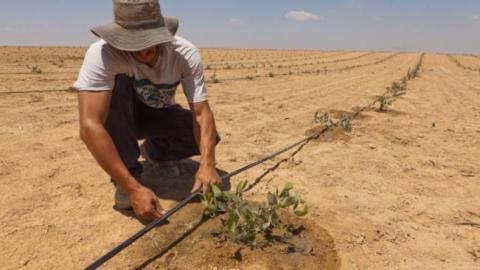Israel Is Undisputed World Leader in Using Purified Wastewater
The Water Authority publishes a biannual survey of wastewater management, in conjunction with the Israel Nature and Parks Authority. The latest survey, containing data for 2014, covers 99 percent of the country’s population. The data show that purified wastewater irrigates 419 million square meters (4,510 square feet) of crops. This accounts for almost a third of all water used for agriculture in Israel, and about a fifth of the country’s total water consumption.
The quality of treated wastewater is determined largely by the concentration of two salts – chloride and sodium – since these salts damage both crops and the land itself if present in high concentrations.
In recent years, the increased use of desalinated seawater, and the corresponding decrease in the use of water from Lake Kinneret (which is relatively salty), has decreased the presence of these salts in wastewater. The survey also found a decline in other pollutants. The document predicts that by 2018, 80 percent of purified wastewater will be fit for unrestricted agricultural use. This will mainly be thanks to plans to upgrade several large purification plants, including the Soreq plant, which handles waste from western Jerusalem, and the Haifa plant.
Another factor contributing to the improved quality, the study said, is that wastewater is now dealt with by municipal water and sewage corporations. These companies have built infrastructure for collecting wastewater and improved the maintenance and management of treatment plants. Yet another major factor was the enactment of new regulations barring companies from sending their wastewater into municipal sewage systems if it contains high levels of industrial pollution.
Though desalinated water has the advantage of being less salty, its use has created other potential problems for farmers. One is that it has a higher concentration of boron, which is naturally found in relatively high concentrations in seawater but can be damaging to crops. So far, however, no treated wastewater has been found to contain boron in concentrations above the maximum permitted for irrigation.
Despite Israel’s wastewater achievements, it has some problems that have yet to be solved. First, some parts of the country lack facilities for storing treated wastewater, and this sometimes results in it being released into nearby streams. And in Jerusalem, no solution has yet been found for wastewater produced in the city’s eastern half, so that waste still flows into the Kidron Stream and pollutes it.
Moreover, no effective means have yet been found to purify wastewater of traces of medications excreted by people who use them. Research into such trace medications has only begun in recent years, so it’s not clear how high a concentration would be dangerous for people who don’t take those medications.
Early in the previous decade, an interministerial committee decided to require higher standards for recycled wastewater. That triggered efforts to upgrade treatment plants, which are still in progress today.
Several of the country’s treatment plants already meet the new, stricter standards – most notably the Shafdan plant, which treats 130 million cubic meters of wastewater a year from the Greater Tel Aviv region. Consequently, treated wastewater is now widely used for irrigation in both the north and the western Negev. Nationwide, the quantity of treated wastewater rose by 10 percent from 2010 to 2014, the study said.
Zafrir Rinat

